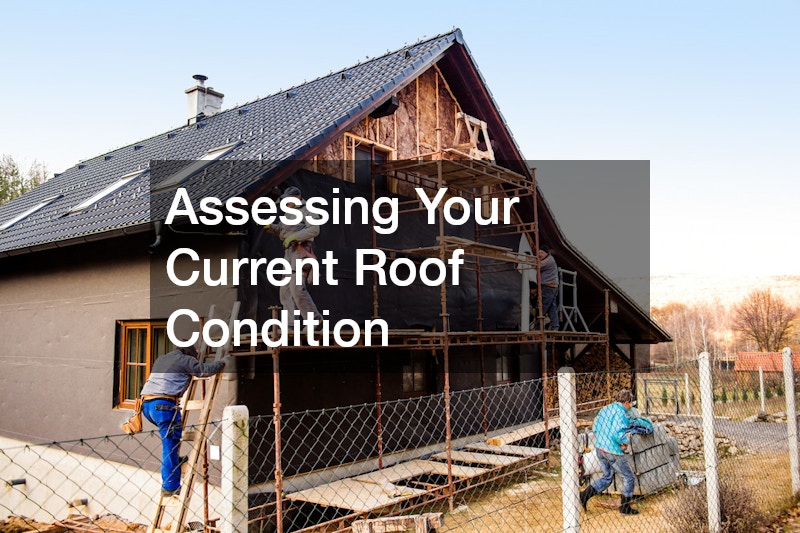When it comes to your home, the roof plays a crucial role in protecting you and your family from the elements. As time goes by, your roof may wear out and require replacement. In this comprehensive guide, we will walk you through our roof replacement checklist, the process of assessing your current roof condition, understanding different roofing materials, setting a budget, researching local professionals, and much more to ensure a successful roof replacement project.
Assessing Your Current Roof Condition

Before embarking on a roof replacement project, it is essential to assess the current condition of your roof. Hiring residential roofing services to conduct a thorough inspection can help identify any issues such as leaks, missing shingles, or structural damage. Creating a roof replacement checklist can help you keep track of the necessary repairs and replacements to ensure a long-lasting and durable roof.
Regular maintenance and inspection of your roof can prolong its lifespan and prevent costly repairs down the line. By addressing any issues promptly, you can avoid further damage and ensure the safety of your home and family.
Consulting with roofing contractors can provide you with expert advice on the condition of your roof and recommend the best course of action. They can offer insights on the most suitable roofing materials based on your location, climate, and budget.
Understanding Different Roofing Materials
When it comes to roof replacement, there are various roofing materials to choose from, each with its own set of advantages and disadvantages. Working with experienced roofing contractors can help you select the right material for your home’s style and needs. Whether you opt for traditional asphalt shingles, durable metal roofing, or eco-friendly options like solar tiles, the choice of material can impact the longevity and performance of your new roof.
Residential roofing services can provide you with samples and recommendations to help you make an informed decision. Factors such as maintenance requirements, energy efficiency, and durability should be taken into account when choosing the right roofing material for your home.
Investing in high-quality roofing materials as part of your roof replacement checklist can enhance the curb appeal and value of your property while providing superior protection against the elements. Consider the long-term benefits of different materials before making your final decision.
Setting a Budget for Your Replacement Roof
One of the critical aspects of a roof replacement project is setting a realistic budget that aligns with your financial capabilities. Roof replacement costs can vary depending on the size of your roof, the chosen materials, and any additional features or upgrades. By consulting with roofing companies and getting multiple quotes, you can compare prices and services to find the best value for your investment.
Creating a detailed budget that includes all the necessary expenses such as materials, labor, permits, and disposal as part of your roof replacement checklist, which can help you avoid any unexpected costs during the project. Be sure to account for any potential setbacks or unforeseen repairs that may arise during the roof replacement process.
While it may be tempting to choose the lowest bid, it is essential to prioritize quality and experience when selecting a roofing company for your project. Look for reputable contractors with a proven track record of delivering high-quality work within the agreed budget and timeline.
Researching Local Roofing Professionals

When it comes to roof replacement, finding the right roofing professional is crucial to the success of your project. Conducting thorough research on local residential roofers can help you identify reputable and reliable contractors in your area. Look for companies with positive reviews, relevant experience, and proper licensing and insurance to protect your investment.
Ask for recommendations from friends, family, or neighbors who have recently had their roofs replaced to get first-hand insights into the quality of workmanship and customer service provided by local roofers. Be sure to check online platforms and review websites to gather additional feedback and ratings on potential contractors.
Scheduling consultations with multiple roofing companies can give you an opportunity to discuss your project requirements, ask questions, and receive written estimates. Compare the proposals and communication styles of each contractor to make an informed decision that meets your expectations and budget.
Questions to Ask Your Roofing Professional
Before hiring a roofing company for your project, it is essential to ask relevant questions as part of your roof replacement checklist to ensure they are the right fit for the job. Inquire about their experience with roof replacement projects similar to yours, the timeline for completion, and the warranty options available. Transparency and communication are key factors in establishing a successful working relationship with your roofing professional.
Ask about the materials and techniques they plan to use for your roof replacement and whether they comply with building codes and regulations in your area. Understanding the process and timeline of the project can help you set realistic expectations and avoid any potential delays or issues down the line.
Discuss payment schedules, permits, and insurance coverage with your roofing contractor to ensure a smooth and stress-free experience. Clear communication and a detailed understanding of the project scope can help prevent misunderstandings and ensure a successful roof replacement process.
Getting Written Estimates
When gathering estimates for your roof replacement project, it is essential to get everything in writing to avoid any confusion or disputes later on. Request detailed quotes from roofing companies that include the cost of materials, labor, permits, and any additional services such as cleanup and disposal. Compare the estimates side by side to evaluate the overall value and scope of work offered by each contractor.
Review the terms and conditions of each proposal carefully as part of your roof replacement checklist, paying attention to any exclusions or additional costs that may apply. If there are any discrepancies or uncertainties in the estimates, be sure to seek clarification from the roofing company before making your final decision. A transparent and detailed written estimate can help you make an informed choice and protect your interests throughout the project.
Consider the reputation and reliability of each roofing contractor in addition to the pricing offered in their estimates. Look for companies with a proven track record of delivering high-quality workmanship, excellent customer service, and timely project completion to ensure a positive experience from start to finish.
Understanding Building Codes and Permits

Before starting your roof replacement project, it is essential to understand the local building codes and permit requirements in your area. Working with local roofers who are familiar with the regulations and guidelines can help you navigate the permitting process smoothly. Failure to obtain the necessary permits can result in fines, delays, or even the removal of your new roof, so it is crucial to comply with the legal requirements.
Consult with your roofing professional as part of your roof replacement checklist to ensure that all permits and approvals are obtained before commencing work on your roof replacement. They can provide guidance and assistance in completing the necessary paperwork and ensuring that the project meets all safety and structural standards set by your local building authority.
By following the building codes and permit requirements, you can ensure that your roof replacement project is completed safely, efficiently, and in compliance with the law. Addressing any regulatory issues promptly can help you avoid legal consequences and enjoy a hassle-free experience throughout the construction process.
Planning for Installation Day
As the installation day for your new roof approaches, it is essential to make the necessary preparations to ensure a smooth and successful project as part of your roof replacement checklist. Coordinate with your roofing company to confirm the start date, timeline, and logistics of the installation process. Clear communication and detailed planning can help minimize disruptions to your daily routine and ensure a stress-free experience.
Prepare your home for the roof replacement by clearing out any valuables or fragile items from the work area and securing any pets or children to ensure their safety during construction. Discuss the access points and parking arrangements with your roofing professional to facilitate the delivery of materials and equipment on the installation day.
Be prepared for noise, dust, and debris during the roof replacement process and make arrangements to accommodate any inconveniences that may arise. By planning ahead and communicating effectively with your contractor, you can help the installation day run smoothly and efficiently, leading to a successful outcome for your new roof.
Reviewing Warranty Options
When investing in a new roof, it is essential to consider the warranty options available to protect your investment and provide peace of mind. Discuss the warranty coverage offered by your roofing company, including manufacturer warranties for materials and workmanship guarantees for labor. Understanding the terms and duration of the warranties can help you make an informed decision and safeguard your new roof against any defects or issues.
Ask your roofing professional about the warranty process and what steps are required to file a claim in case of any problems with your roof. Ensure that you receive all warranty documentation in writing and keep it in a safe place for future reference. Regular maintenance and inspections can help preserve the warranty coverage and prolong the lifespan of your new roof.
By reviewing the warranty options and understanding the coverage provided, you can rest assured that your investment is protected and that your roof replacement project will be backed by reliable guarantees. Choose a contractor who offers comprehensive warranty support as part of your roof replacement checklist to ensure long-term satisfaction and confidence in your new roof.
Post-Installation Care and Maintenance
After completing your roof replacement project, it is essential to establish a routine care and maintenance plan to ensure the longevity and performance of your new roof. Schedule regular inspections and maintenance checks with a roof repair service to address any potential issues early on and prevent costly repairs. Cleaning gutters, trimming trees, and removing debris can help prevent damage and maintain the integrity of your roof.
Consult with your siding installation professional for guidance on post-installation care practices and recommendations for preserving the condition of your new roof. Follow their advice on maintenance tasks and inspections to ensure that your roof remains in top condition for years to come. Addressing any minor repairs promptly can prevent them from escalating into more significant issues down the line.
Consider investing in professional gutter services as part of your roof replacement checklist to keep your gutters clean and functioning correctly, as they play a vital role in directing water away from your roof and foundation. By prioritizing regular maintenance and care, you can extend the lifespan of your roof and protect your home from potential water damage and structural issues.
Signs of Future Problems to Watch For

Even with a new roof, it is essential to be vigilant for signs of potential problems that may arise in the future. Keep an eye out for indicators such as leaks, missing shingles, sagging areas, or water stains on your ceiling, as these could signal underlying issues with your roof. Maintaining a roof replacement checklist can help you track any changes or concerns and address them promptly.
Monitor the condition of your roof regularly and inspect it after severe weather events or seasonal changes to detect any damage or wear and tear. Look for signs of mold, mildew, or algae growth on your roof, as these can indicate moisture issues that need to be addressed promptly. Addressing any warning signs early on can prevent further damage and prolong the lifespan of your roof.
If you notice any issues or concerns with your roof, contact a professional roofing company immediately to assess the situation and recommend the necessary repairs or maintenance. Timely intervention can prevent small problems from escalating into major issues that require extensive repairs or even a full roof replacement. Stay proactive and attentive to the condition of your roof to ensure its longevity and performance over time.
Embarking on a roof replacement project requires careful planning, research, and collaboration with experienced professionals to ensure a successful outcome. By assessing your current roof condition, understanding different roofing materials, setting a budget, researching local professionals, and following a comprehensive roof replacement checklist, you can streamline the process and achieve a durable and long-lasting roof for your home. Remember to prioritize quality, reliability, and proper maintenance to ensure that your new roof remains in optimal condition and continues to safeguard your family and property. With the right information and guidance, you can navigate the roof replacement process with confidence and achieve a stunning and functional roof that enhances the value and appeal of your home.
